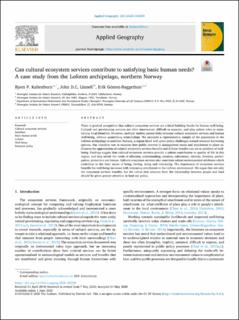Can cultural ecosystem services contribute to satisfying basic human needs? A case study from the Lofoten archipelago, northern Norway
Peer reviewed, Journal article
Published version

Åpne
Permanent lenke
https://hdl.handle.net/11250/2684733Utgivelsesdato
2020Metadata
Vis full innførselSamlinger
- Publikasjoner fra CRIStin - NINA [2364]
- Scientific publications [1392]
Originalversjon
10.1016/j.apgeog.2020.102229Sammendrag
There is gradual recognition that cultural ecosystem services are critical building blocks for human well-being. Cultural and provisioning services are often intertwined, difficult to separate, and play salient roles in maintaining local identities. However, multiple studies assume links between cultural ecosystem services and human well-being, without quantifying relationships. We surveyed a representative sample of the population in the Lofoten archipelago in northern Norway, a region faced with great policy challenges around resource harvesting options. Our objective was to examine how public interest in management issues and attachment to place influences the appreciation of cultural ecosystem services benefits and if these benefits can act as satisfiers of wellbeing. Findings suggest that cultural ecosystem services provide a salient contribution to quality of life in this region, and help satisfy the needs of affection, understanding, creation, subsistence, identity, freedom, participation, protection and leisure. Cultural ecosystem services also constitute salient environmental attributes which contribute to the basic needs of being, having, doing and interacting. The importance of ecosystem services benefits for well-being increases with increasing attachment to the Lofoten environment. We argue that not only the ecosystem services benefits, but the values that emanate from the relationship between people and land should be given greater attention in land use policy. Cultural ecosystem services Satisfiers Basic human needs Lofoten Well-being Resource policy
